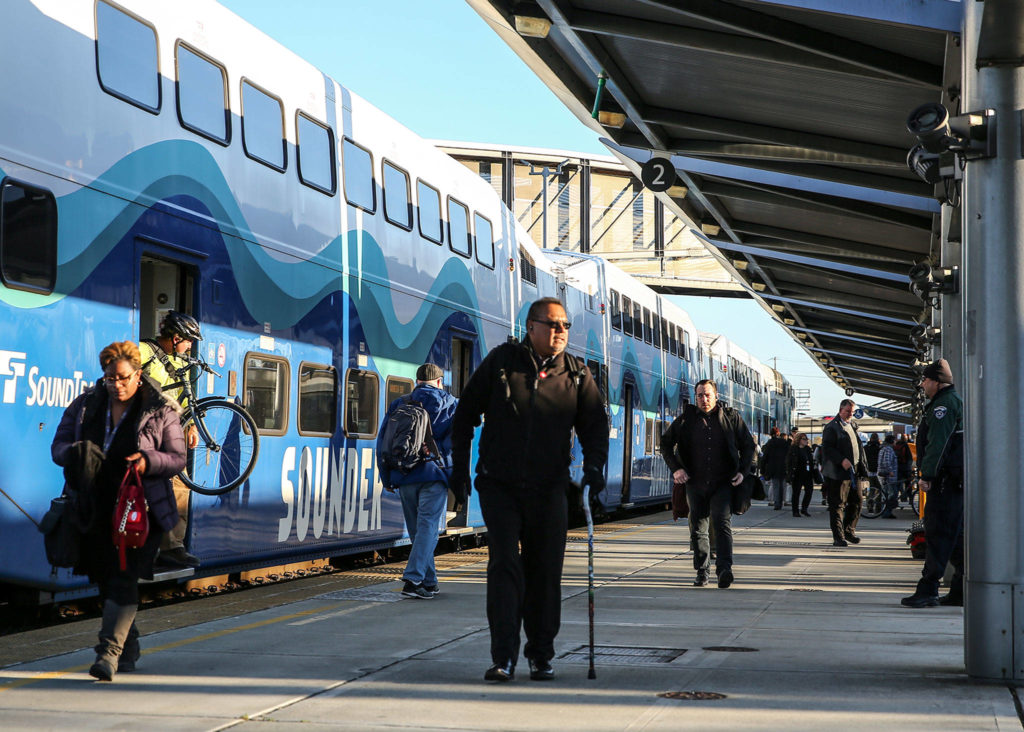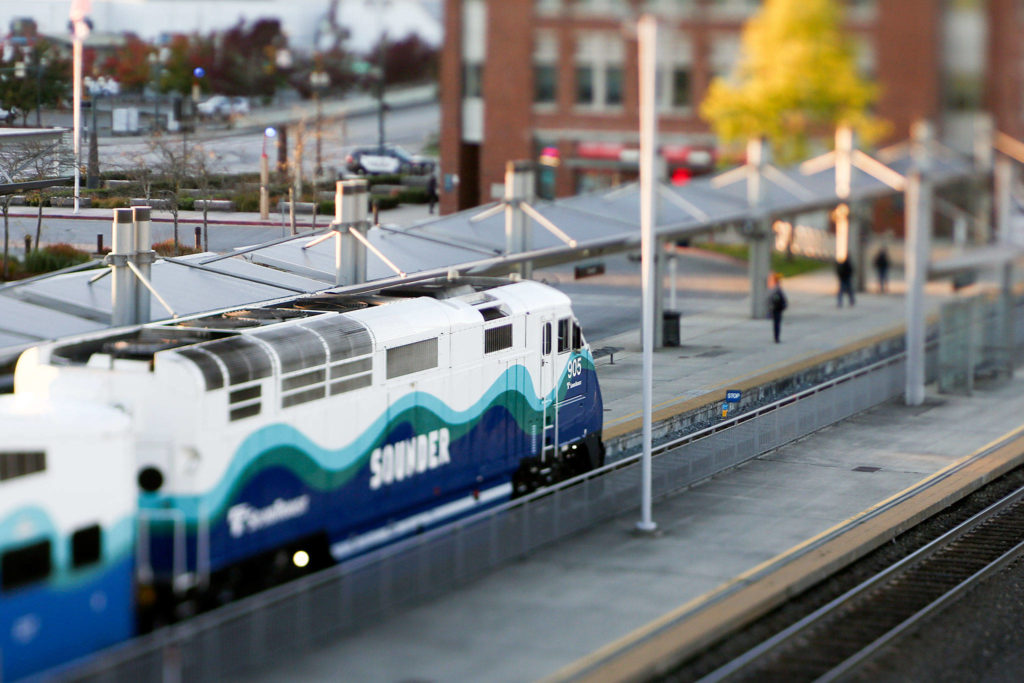EVERETT — This will not be the first time voters will consider a ballot measure capping the annual cost of car tabs at $30.
Nor the second.
It’s the third.
Will Initiative 976 be the last?
“My gut tells me this is not over,” said Sid Maietto, a signer of the pro argument in the voters pamphlet. The Snohomish resident is a plaintiff in a lawsuit challenging the legality of the motor vehicle excise tax.
“We all are wondering when the politicians are going to listen,” he added.
Anti-tax crusader Tim Eyman is the force behind the $30 car tab fee concept — embraced twice before by the state’s electorate.
If voters side with Eyman, almost overnight, a stream of dollars counted on for maintaining highways, repairing bridges, operating buses and expanding light rail would start to dry up. It would, in the short term, throw the state, dozens of cities and Sound Transit for a loop. One dire prediction even sees light rail not reaching Everett.
“All will be hit pretty hard,” said Sen. Steve Hobbs, D-Lake Stevens. “Every city relies on the state for help on transportation funding.”
Legislators will be forced to triage the state’s two-year transportation budget and decide where spending can be cut and which projects can be delayed or canceled, he said.
The nitty gritty
I-976 takes aim not just at the annual vehicle registration fee, but also critical sources of funding for local and state transportation projects, and Sound Transit expansion.
Its signature element is capping the annual registration fees for most passenger vehicles at $30. To do that means other fees and taxes shrink or disappear. Most weight fees would be eliminated. So too would license fees levied by transportation benefit districts that exist in Everett, Lynnwood and 60 other cities.
The electric vehicle fee now at $150 would drop to $30. It was implemented to compensate for the loss of gas tax revenue. The newest fee added to car tabs, a $75 charge for hybrid and electric vehicles that pays for new charging stations, would not be affected because it was only recently enacted.
Its other significant element would axe a pivotal source of revenue to carry out Sound Transit’s voter-approved expansion in 2016 known as ST3. The measure intends to do away with the entire 1.1% motor vehicle excise tax (MVET) imposed by the transit agency of which the majority is earmarked for ST3.
The way Sound Transit values vehicles is a catalyst for this year’s ballot fight. Initiative backers say voters got duped in 2016. They thought the transit agency would stop using a depreciation schedule that overvalues newer vehicles and switch to one that more accurately calibrates a vehicle’s worth. The agency didn’t. Use of the schedule combined with a near tripling of the tax rate caused car tab costs to surge, sending a wave of sticker shock through the region.
The initiative requires the regional transit authority, by March 31, 2020, to retire, refinance or defease all outstanding construction bonds financed with money collected from car tab receipts — if it’s doable. If not, Sound Transit would be forced to live with less MVET revenue.
The initiative doesn’t preclude the cost of tabs from rising again. It would require any proposed increase — be it by the state, a local government or Sound Transit — be approved by voters. But going forward, any new MVET would have to be calculated using Kelley Blue Book values.
This ensures taxpayers a degree of assurance, Eyman said, that “at least you’ve asked our permission and you’ve taxed us honestly.”
A blow to budgets
If I-976 passes, state lawmakers and Gov. Jay Inslee can expect to spend the 2020 session looking for ways to replenish the lost dollars for an already underfunded transportation system. Communities in Snohomish County and around the state would face a loss of money for filling potholes and repaving streets. And the blow to Sound Transit could be disabling as the agency embarks on one of the largest transit expansions in U.S. history.
A fiscal analysis prepared by the state Office of Financial Management predicts Washington will see $475 million drained from a variety of accounts in its transportation budget. Over six years the loss could reach $1.9 billion, hitting hardest the account supporting transit systems across the state.
Local governments stand to collectively lose $58.2 million a year in transportation benefit district fees.
That money represents a significant portion of revenue many Snohomish County cities spend on maintaining roads and sidewalks. The fee ranges from $20 to $40.
Everett would lose about $1.5 million — which makes up about half of the pavement maintenance budget — forcing the city to defer projects.
And in the end it would cost taxpayers more, Everett Mayor Cassie Franklin said. Streets are much more costly to rebuild than to maintain.
As the city faces a large budget deficit, she said, Everett wouldn’t be able to fill that hole.
“We need these tools, like the transportation benefit district, to fill these gaps,” Franklin said. “We need revenue to pay for services.”
The hit to the city would continue, also leaving an annual $700,000 gap in Everett Transit’s budget. The mayor believes such a cut would extend beyond wiping out Sunday bus service.
About $1.2 million would be erased from Lynnwood’s transportation budget. And in Edmonds and Granite Falls, about a third of funding for street work would evaporate.
Cities worried about losing this money are pushing back. In September the Everett City Council passed a resolution opposing I-976. Seattle, Olympia and Tacoma have followed suit. Lynnwood is set to do the same on Monday.
Eyman brushes off opponents’ dire claims and insists there’s money.
Lawmakers could tap the state’s $3.5 billion budget surplus. And they can give local governments authority to collect road fees with approval of voters.
It’s a route lawmakers took when they lowered car tab fees in response to the passage of Initiative 695 in 1999.
Opponents’ present-day warnings are the same “lies and scare tactics” deployed 20 years ago, Eyman said. They said awful things might happen, and awful things didn’t happen, so voters won’t be fooled again, he said.
If the measure passes, Sound Transit takes a jolt, losing $328 million a year and nearly $2 billion through six years, according to state projections. This would place transit expansion at risk. The transit agency pegs the loss at $20 billion through 2041 when the last ST3 extension is set to open.
“This is not a scare tactic,” said Dave Somers, Snohomish County executive and a member of the Sound Transit board.
That cut makes up about half the ST3 package, according to Somers. “We would likely not see light rail coming to Everett from Lynnwood.”
With the Everett Link Extension at the end of the line, it’s probably one of the first projects that would get dropped, he added.
Two light rail lines in Seattle, to Ballard and West Seattle, and connecting the spine to Tacoma are set to open before trains are scheduled to start arriving in Everett in 2036. The Kirkland to Issaquah line is the last on the ST3 timeline.
“Anything that interrupts the revenue stream causes us to start over on the ST3 package,” Somers said.
He said Snohomish County projects were cut before when Sound Transit funding became imperiled.
Sound Transit appears to have options if it loses car tab receipts. It could bond against property tax collections or go back to voters to reestablish an MVET.
Somers was doubtful voters would be in a mood to do so right after passing the initiative.
Money, money, money
This car tab battle is playing out much like its predecessors.
On one side is Eyman. He isn’t raising money. There won’t be television commercials or colorful mailers extolling the virtues of the measure.
The campaign he conducts is fueled by his relentless, single-minded evangelism. He criss-crosses the state to speak with editorial boards, at forums and anywhere else he can garner media attention. The concept is simple to understand. The two times he’s managed to get a car tab measure on the ballot, it passed.
“Voters don’t care which side has the most money,” he said. “They care about which side has the better argument.”
On the other side is Keep Washington Rolling, the political committee conducting the No on 976 campaign. It had raised $2.6 million as of Oct. 11 with Microsoft the largest contributor at $650,000, according to reports filed with the Public Disclosure Commission.
Commercials are airing on network television stations now. Multi-page mailers will be arriving in mailboxes soon. Leaders have predicted the final spending tally could top $3 million as they try to educate a majority of voters about the consequences of paying less money for registering a vehicle.
“This is not just about Sound Transit, this is about street overlays, fixing potholes, buses and ferries, all those pieces of the network we need so we can get around,” Everett Councilmember Brenda Stonecipher said last month. “I hope our citizens statewide can see through this initiative.”
Jerry Cornfield: 360-352-8623; jcornfield@herald net.com. Twitter: @dospueblos.
Been down this road before
Here’s a recap of Tim Eyman’s many tries to get this matter on a ballot.
1998 — Initiative 691: Failed to qualify.
1999 — Initiative 695: Passed with 56.2% statewide, 61% Snohomish County. Declared unconstitutional but legislators and Gov. Gary Locke approved law carrying out the will of voters.
2002 — Initiative 776 : Passed with 51.5% statewide, 52.7% Snohomish County. Provisions repealing Sound Transit MVET collections blocked.
2006 — Initiative 917: “SaveOur30tabs.com” failed to qualify
2016 — Initiative 1421: “Bring Back Our $30 Car Tabs” failed to qualify
2016 — Initiative 869: “We Love Our Cars” capped car tabs and repealed tolling authority. Failed to qualify.
2017 — Initiative 947: “Bring Back Our $30 Car Tabs” failed to qualify
2019 — Initiative 976: “Bring Back Our $30 Car Tabs” qualified.
FYI
What: Initiative 976 forum hosted by The Herald
When: 7 p.m. Thurs. Oct. 17
Where: WSU Everett, 915 N. Broadway, Room 102.
Pro: Initiative sponsor Tim Eyman
Con: Everett Mayor Cassie Franklin, Sen. Steve Hobbs
The event will be live streamed at www.heraldnet.com and by TVW at www.tvw.org.
Talk to us
> Give us your news tips.
> Send us a letter to the editor.
> More Herald contact information.



























